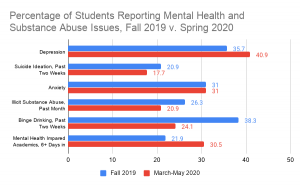
A “dumpster fire”–that’s how Hunter College junior Marianny Pantophlet described the school’s sudden transition to remote learning last year.
“There is no joy or motivation with online classes, whereas in person there was at least that” the emerging media major said. “My attention is just not there for online classes.”
It didn’t help that her depression only got worse after moving to remote learning. “I found myself struggling to get out of bed,” she said.
Pantophlet began taking antidepressants as a result of the pandemic, though she had to switch between different ones, and even contemplated whether she had ADHD.
Each year, an estimated 1 in 5 U.S. children experience a mental, emotional or behavioral disorder, including anxiety, depression, attention-deficit hyperactivity disorder and disruptive behavioral disorders.

As a result of school closures and remote learning, students’ routines have changed suddenly and dramatically. “Based on prior community crises, we can reasonably anticipate increases in anxiety, depression and trauma,” Sharon Hoover, PhD, co-director of the National Center for School Mental Health at the University of Maryland School of Medicine, said in a press release.
Still only about 20% receive any kind of care from a mental health specialist according to the U.S. Centers for Disease Control and Prevention.
To support these students, CUNY partnered with a few mental health services, as a result of the $5 million expansion of CUNY funds supported by the CARES Act. It is designed to create a path for more students to receive face-to-face counseling, a Crisis Text line, and other remote wellness services such as teletherapy.
The first introduced is the 24/7 crisis intervention organization Crisis Text Line. Any CUNY student struggling with psychological or emotional problems can text “CUNY” to 741741 for a free and confidential conversation with trained volunteers.
Psychology major Luisais Taveras had a unique experience with the existing counseling resources at Hunter. “I always had anxiety going to therapy,” she said.
“I think Hunter needs to acknowledge that they do not have the necessary staff to cater to thousands of students that use their facilities,” she said of the Health and Wellness Departments.
Taveras explained that when seeking therapy at Hunter one gets 10 total sessions, one session a week for about 40 minutes to an hour. While they do offer additional support groups they cater more towards specific needs.
Students can get a referral at the end of their sessions if they would like to continue their support, but students are deterred by this fact given that they would establish a connection with their therapist at Hunter, and did not want to start from scratch. Marianny said that she needed stability which kept her from seeking further resources.
As part of the plan to increase mental health services to students, CUNY also acquired access to Talkspace, a platform that allows out-of-state and international students to get teletherapy from licensed counselors via text or teleconference. This serves as a resource to out of state students given that CUNY mental health professionals are restricted by law from doing teletherapy across state lines.
In order to keep up with the increasing demand of health professionals, there will now be 10-hour training courses to 120 campus clinical counselors that will lead to a certification in “telemental health,” said CUNY on their website.
The university will begin providing faculty and staff with access to an online training program called Kognito. This entails a “suite of real-time simulations aimed at helping them identify and respond to students in crisis,” according to the CUNY website.
Taveras still hopes to see on-campus learning again. CUNY’s website posted an update stating that there are plans to reopen moderately in the Fall of 2021. “CUNY will plan for a safe and gradual return to mostly in-person instruction and support services in time for the start of classes in Fall 2021.”

